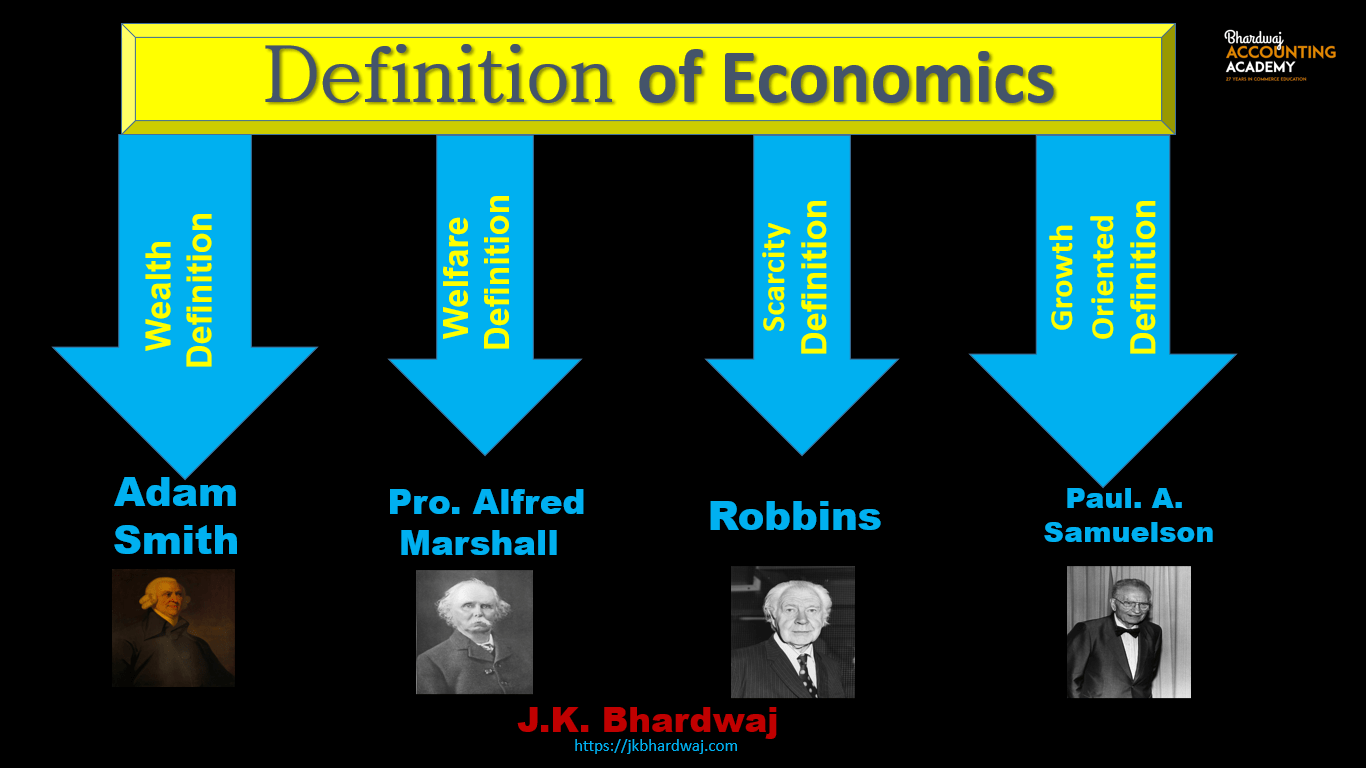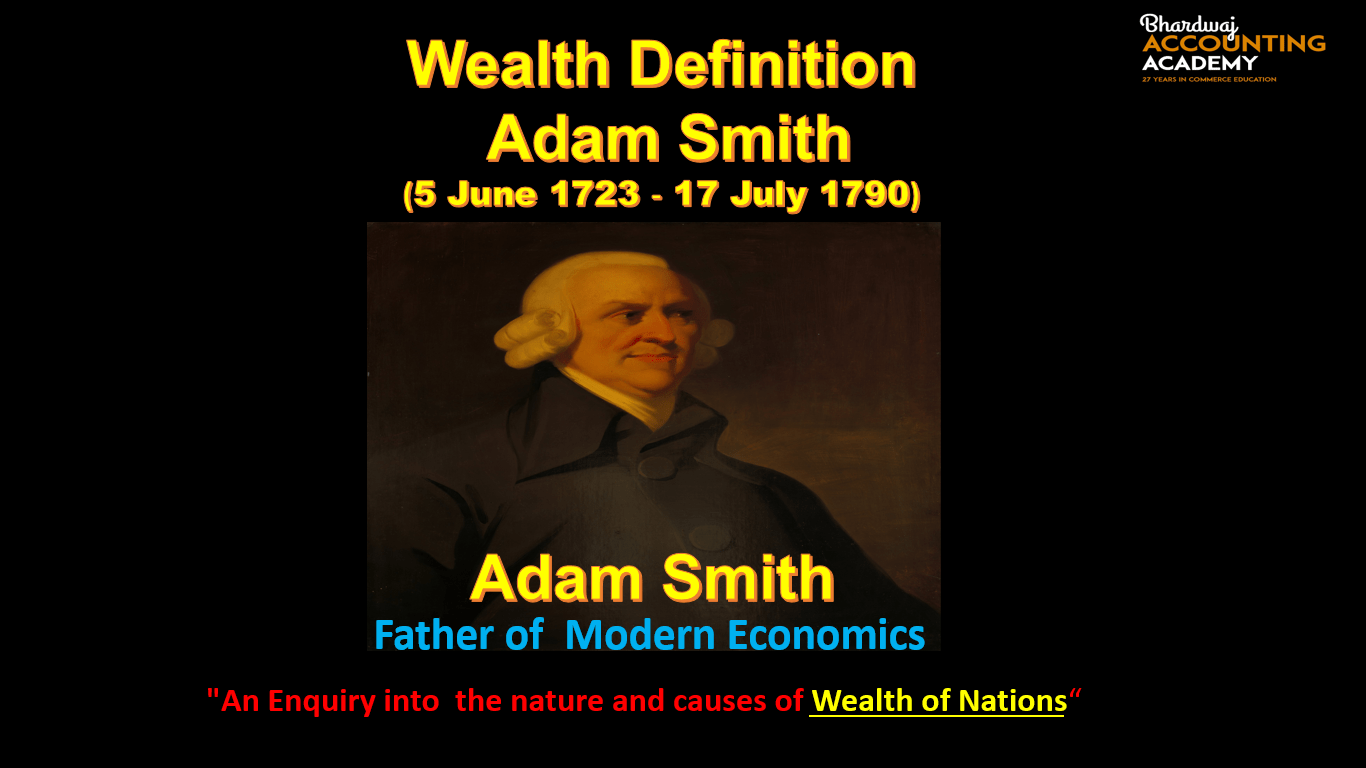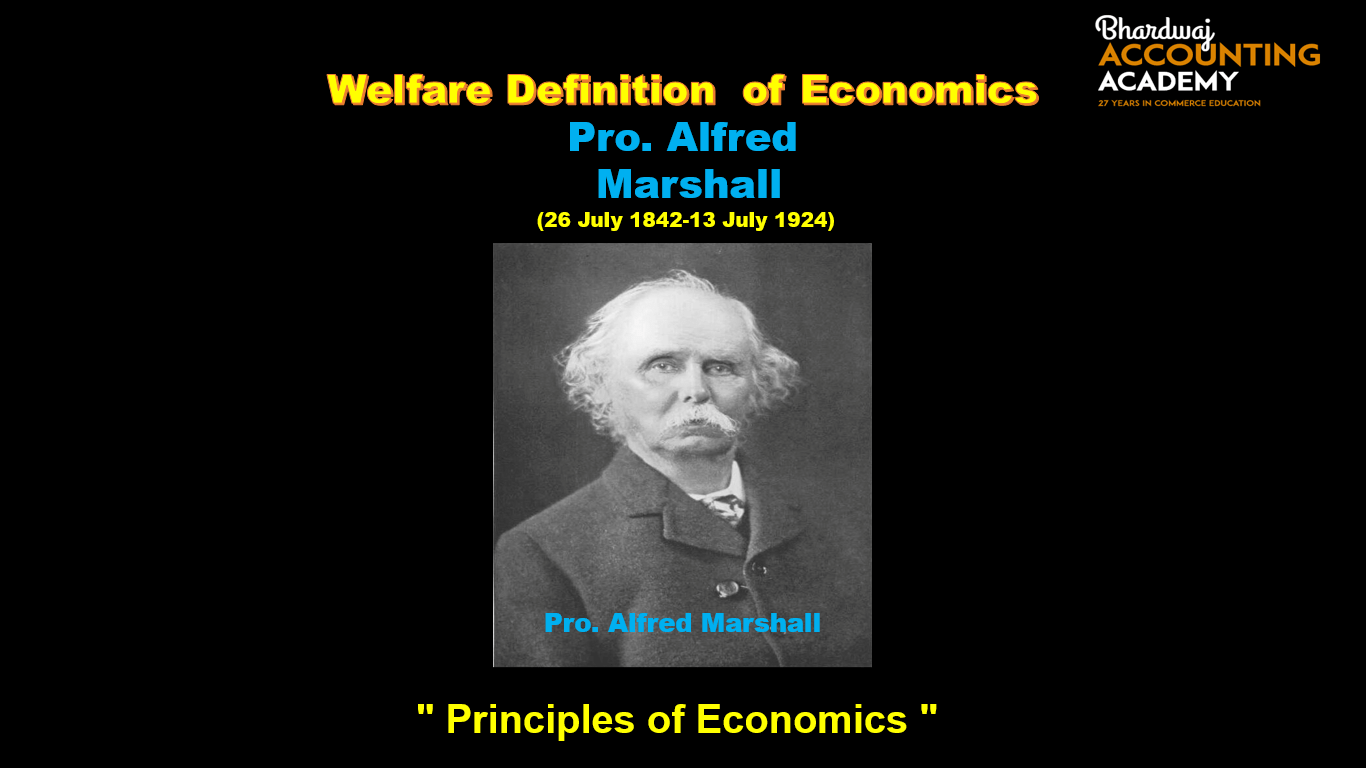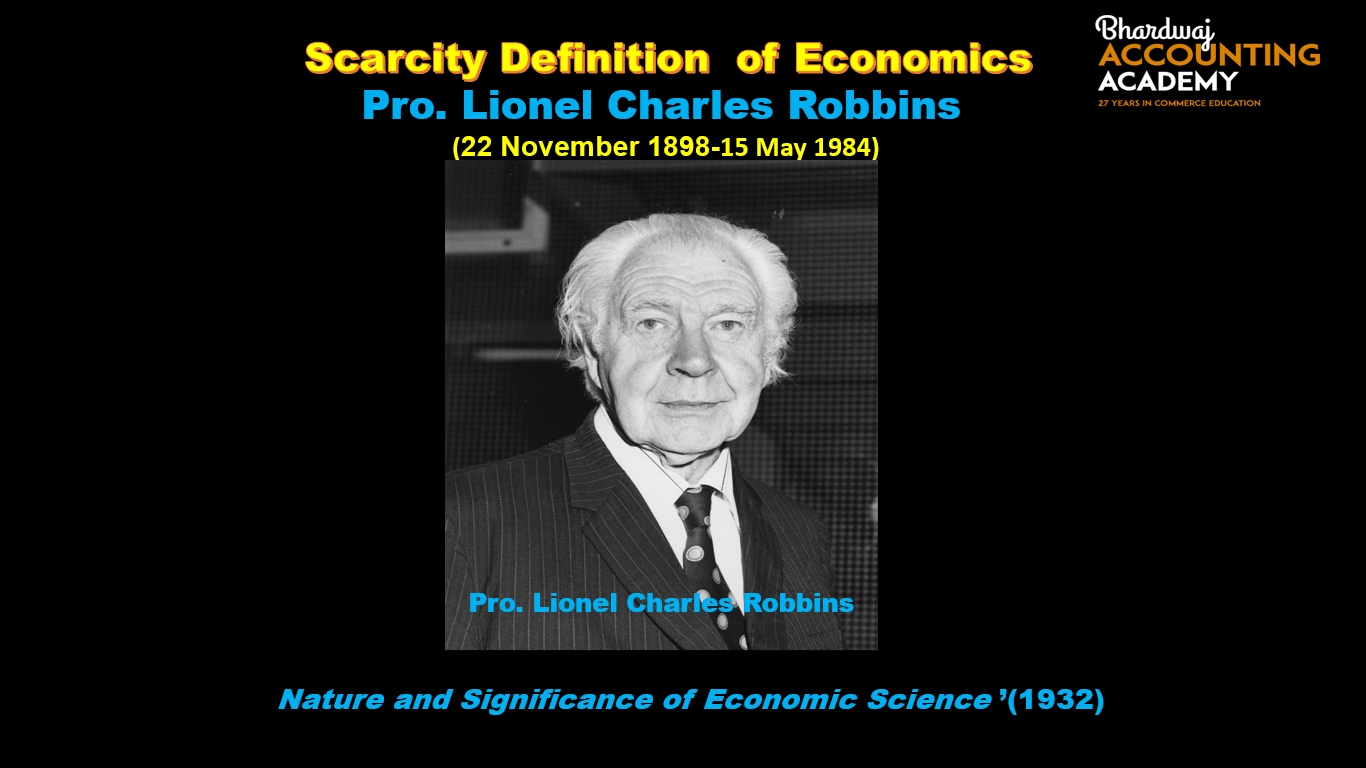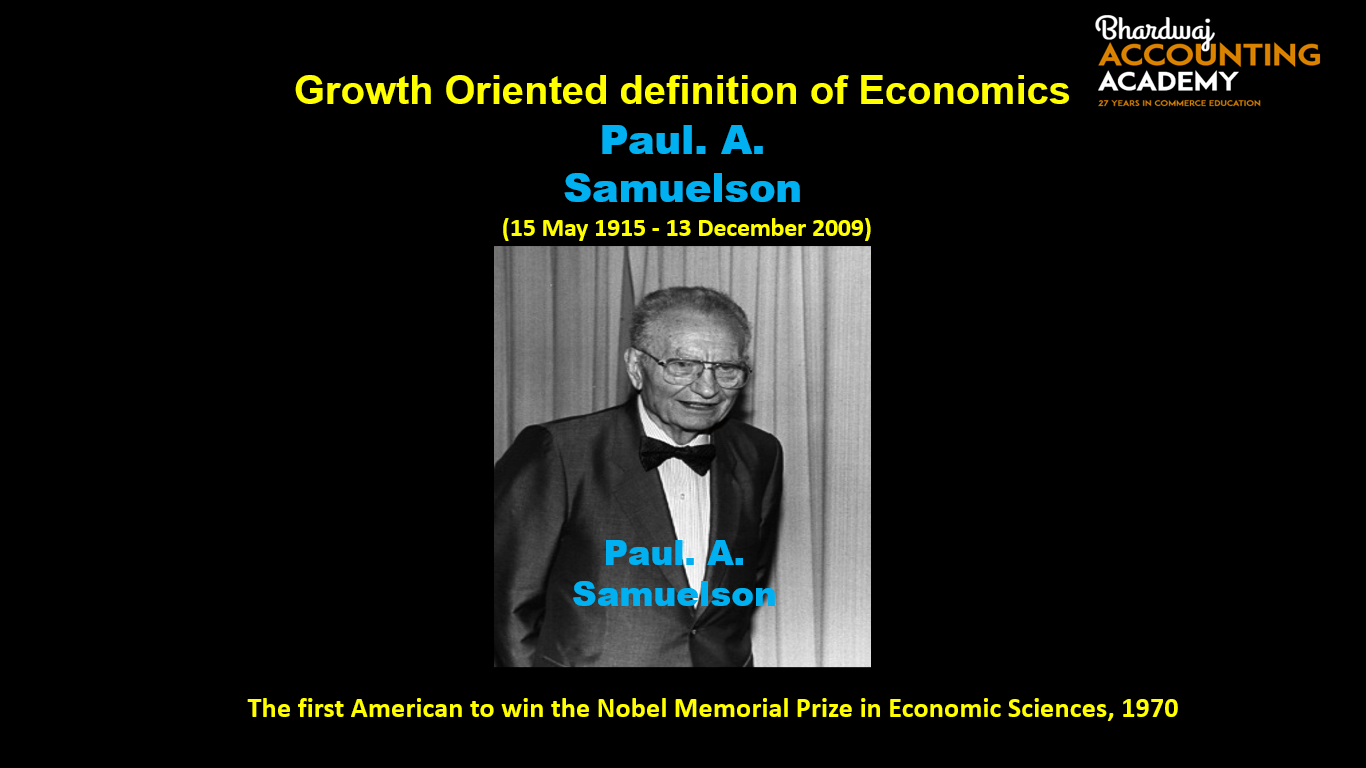Table of Contents
Definition of Economics
Definition of Economics-
Simple Definition of Economics-
“Economics is a Branch of social (behavior of people living in society) science (study of theories in the systematic ways) which study of how society uses its limited (scarce) resources, which have alternative uses, to produce goods and services and to distribute them among different group of people (Society) It makes sure that all the available resources are put to best use”.
Wealth Definition Of Economics by Adam Smith-
“Economics as A science which enquires into the nature and causes of wealth of nations, and it related to the laws of production, exchange, distribution and consumption of wealth”.
“Economics is the science of wealth”.
Main features of Wealth definition-
The main features of Wealth definitions are as follows:
1. Study of Wealth: According to the wealth definition, economics is the study of wealth only. The main object of economics is to examine how people earn wealth and spend it. Wealth has been made the focal point of economics by the classical economists.
2. Causes of Wealth: Economics seeks to examine causes which lead to an increase of wealth, Wealth can be increased by its production and accumulation.
3. Economic Man: The wealth definition of economics considers an ‘economic man’ who is aware of his self-interest. The economic man tries to achieve his self-interest by increasing his material gains through the acquisition of wealth.
4. Huge stress on Wealth:
The main aim of an economy is to become rich. Hence, it gives more stress on wealth not anything else.
Criticisms of Wealth definition-
1.Too Much Importance to Wealth
Definition of Economics by Adam Smith gives primary importance to wealth and secondary to human being. This emphasis has now shifted from wealth to human being. Man occupies primary place and wealth a secondary one. The real fact is that man is more important than study of wealth.
2. Narrow Meaning of Wealth
In the definition the word “Wealth” means only material goods such as vehicles, industries, raw material, Banks etc. it does not include immaterial goods like services of doctor, lawyer and teachers. In modern economics definition the word “Wealth” includes both material and immaterial goods.
3. Concept of Economic Man
According to this main objective of human activities is only to earn more and more wealth. in other words he earns only for his self-interest and social interest is completely ignored.
4. Man Welfare is Missing
The other objection by Marshall is that man’s welfare has not been mentioned in Adam’s definition of economics. He has stressed much on wealth. Wealth is a means to an end, the end being the human welfare.
5. It ignores the problem of Scarcity
Welfare Definition Of Economics by Pro. Alfred Marshall-
” Economics is a study of mankind in the ordinary business of life; it inquires how he gets his income and how he uses it. it examines that part of individual and social action which is most closely connected with the attainment (acquisition) and with the use of the material requisites of wellbeing. Thus it is on the one side a study of wealth; and on the other, and more important side, a part of the study of man”.
- Alfred Marshall put forward this definition.
- According to Alfred Marshall, economics is the study of man in the ordinary business of life.(Study about the economic activities of man)
- Ordinary business of life” refers to the daily, routine activities that people engage in to earn a living, acquire goods and services, and manage their resources.
- It examines how a person gets his income and how he invests it.
- “Attainment” primarily means achieving or acquiring something, usually through effort.
- Thus, on one side, it is a study of wealth.
- On the other hand, the more important side, a part of the study of man”.
- “Material requisites” are the basic things we use or buy with money to meet our daily needs and improve our standard of living.
- Well-being refers to the overall quality of life and happiness of people, especially in terms of their basic needs being met.
Main features of Welfare definition-
The main features of the Welfare definition are as follows:
1. Economics is a study of those activities that are concerned with the material welfare of man.
2. Economics deals with the study of man in ordinary business of life. Economics does not study of all the activities of man.
3. It studies how people get their income, how they use it, and how they make the best use of their resources.
4. Economics is the study of personal and social activities concerned with material aspects of well-being.
5. Economics is an Art and science.
6. It is a social science. A person who is cut away from society is not the subject of the study of economics.
7. Man is the center of his study.
8. Economics studies how people try ‘to increase the material means of well-being.
9. It takes into account the money-earning and money-spending activities of man.
10. Economics studies only the ‘material’ part of human welfare which is measurable in terms of the measuring rod of money.
Criticisms of Welfare definition-
1. Marshall ignores the non-material services like the services of teacher, services of doctor, which has an important contribution of economic welfare.
2.Robbins argued that Marshall could not establish a link between the economic activities of human beings and human welfare. There are various economic activities that are detrimental to human welfare. The production of war materials, wine, etc., are economic activities but do not promote welfare of any society. These economic activities are included in the subject matter of economics.
3. Marshall’s definition aimed at measuring human welfare in terms of money. But ‘welfare’ is not amenable to measurement, since ‘welfare’ is an abstract, subjective concept. Truly speaking, money can never be a measure of welfare.
4. Marshall’s ‘welfare definition’ gives economics a normative character. A normative science must pass on value judgments. It must pronounce whether a particular economic activity is good or bad. But economics, according to Robbins, must be free from making value judgments. Ethics should make value judgments. Economics is a positive science and not a normative science.
5. Finally, Marshall’s definition ignores the fundamental problem of scarcity of any economy.
6. Prof. Marshall has not explained the meaning of wealth clearly.
7. Man spends his income on two kinds of necessities. Some are materialistic while the other are non-materialistic. But according to this definition, non-materialistic necessities are out of subject.
Scarcity Definition of Economics by Pro. Lionel Charles Robbins-
“Economics is a science which studies human behaviour as a relationship between ends and scarce means which have alternative uses”.
Key Points of Definition
Ends= In economics Ends means human needs, wants or desire.
Wants= Wants is an effective desire for a particular thing, which can be satisfied by making an effort to acquire it.
Means = Available resources.
Scarcity = Scarcity is the limited availability of a good or service. Or scarcity means that there aren’t enough resources to satisfy all of human wants and needs.
Alternative uses = Choice making and Allocation of resources.
Main features of scarcity definition-
1. Human wants are unlimited- Human wants are unlimited in number. Whenever one want is satisfied, then automatically several wants grow up. Hence it is endless. With the progress in civilization and development science and technology numerous wants are developed. Again several human wants are reoccurring too. Hence, wants are ‘ever growing and never ending’.
2. Limited Means (resources ): Human wants are unlimited but resources or means to satisfy them are limited. The means (resources) refer to goods and services which we use to satisfy our wants. They are material and non- material goods like time, money, services, resources etc. These resources are scarce.
Here the term scarcity is used not in the absolute sense but in the relative sense i.e., in relation to demand. A commodity may be available in small quantity but if nobody demands, it then it is not scarce. Hence, the scarce means are the basis of all economic problems. Because, if all these means or resources are not scarce, then there will be no problem in economics.
3. Alternative Use of Resource: All the scarce means(resources) can be used in more than one purpose. In other words, they can be used in several purposes. For instance, land is very scarce, but land can be used for construction of buildings, cultivation, playground etc. Likewise, all these economic resources are used for various purposes. Thus, in reality goods can be put to alternative uses of varying importance.
4. Economising(Economical) Resources: The main problem of economics is how to satisfy the unlimited wants with limited means which have alternative uses. Robbins describes this problem as the problem of economising scarce means. In other words, it is the choice of making of an economic activity. According to Cassel, “Economics is the science of Scarcity.” Economics is thus a study of certain kind of economics that is economising the resources.
5. Problem of Choice:
The problem of economising resources leads to the problem of choice. Since wants are numerous and means are scarce, we have to choose the most urgent wants from these unlimited wants. Hence, the consumer will select few wants from the numerous wants according to his preference pattern. Thus, scarcity of resources makes the choice necessary. Hence, Economics is termed as a science of choice.
Criticisms of scarcity definition-
Scarcity definition is more scientific than both wealth and welfare definitions, but still it has following criticisms:
1.Static(stable) definition: Prof Samuelson pointed correctly that Robbins’ definition is not dynamic in nature, because it has only discussed about the problems of present generation, not anything about future generation. Hence the definition suffers with the problem of economic growth.
2. Too Vast: It discussed with the scope of economics to all the activities of mankind that are related to the problem of choice. The problem of choice is found in both social and unsocial beings. Thus it has no social significance in real world.
3. Economic Problems also arise from more supply: Some economists claimed that economic problem also arises from the plenty of goods as well. The Great Depression of 1930s in USA was due to abundance of goods, but not due to scarcity of resources.
4. Not fit for socialistic economy: Prof. Maurice has criticized Robbins’ definition that his definition is not applicable for a socialistic economy, because in this type of economy, the Government takes all the initiatives for supplying all the basic necessities of life among the citizens. For the betterment of whole society the Government usually launches several beneficiary activities.
Growth Oriented definition of Economics by Paul. A. Samuelson-
“Economics is the study of how man and society choose with or without the use of money, to employ the scarce productive resources, which have alternative uses, to produce various commodities over time and distributing them for consumption, now or in the future among various person or groups in society.”
